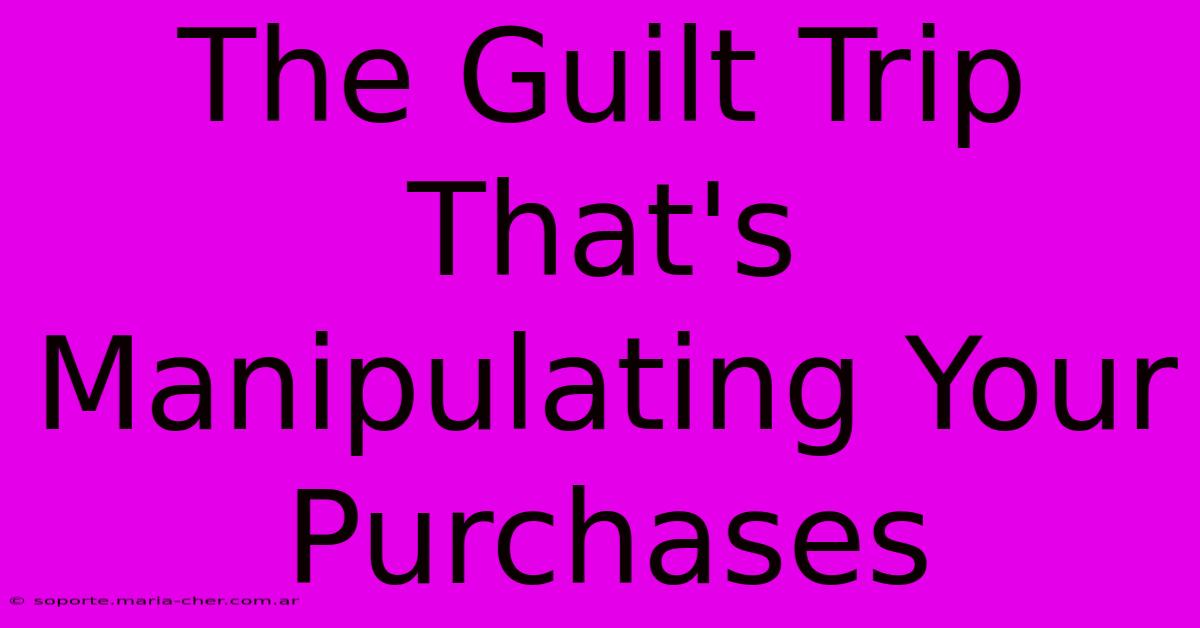The Guilt Trip That's Manipulating Your Purchases

Table of Contents
The Guilt Trip That's Manipulating Your Purchases
We've all been there. That nagging feeling of obligation, the subtle pressure to buy, the almost imperceptible shift from wanting something to needing it. It's not always a hard sell; sometimes, it's a carefully crafted guilt trip disguised as a marketing strategy. Clever marketers know that tapping into our emotions is far more effective than simply listing product features. This article delves into the subtle (and sometimes not-so-subtle) ways brands manipulate our sense of guilt to boost sales.
Understanding the Psychology of Guilt
Before we dissect the marketing tactics, let's understand the psychology behind guilt. Guilt is a powerful emotion, arising from the belief that we've done something wrong or failed to meet an expectation. Marketers exploit this by associating their products with:
- Social responsibility: Think of campaigns highlighting the plight of impoverished communities, with a portion of proceeds donated to charity. Buying the product becomes a way to alleviate your own guilt about global inequality.
- Environmental concerns: Companies leverage eco-consciousness, pushing products marketed as sustainable or environmentally friendly. The guilt of contributing to environmental damage is effectively channeled towards a purchase.
- Personal inadequacy: This is a more insidious tactic, playing on insecurities and fears. Advertisements may subtly suggest that without their product, you're somehow falling short of a certain standard of living or success.
Common Guilt-Tripping Marketing Techniques
Marketers employ a range of tactics to evoke guilt and drive sales. These include:
1. Scarcity and Urgency: The "Limited Time Only" Trap
Creating a sense of scarcity – implying limited availability or a short promotional period – taps into our fear of missing out (FOMO). The underlying message is: "Don't miss out; buy now or regret it later!" This urgency often overwhelms rational decision-making, leading to impulsive purchases driven by guilt at the prospect of missing a deal.
2. Appealing to Empathy and Compassion: The "Save the Children" Approach
Many non-profit organizations and for-profit companies alike leverage charitable donations to generate goodwill and sales. The visual imagery and heartfelt stories aim to create a strong emotional connection, triggering feelings of empathy and guilt if you don't contribute or buy. While supporting good causes is important, it's crucial to distinguish genuine philanthropy from manipulative marketing.
3. Playing on Social Responsibility: The "Ethical Consumer" Angle
The rise of ethical consumerism has given marketers another avenue for guilt-tripping. By associating their products with fair trade, sustainable practices, or animal welfare, they position purchases as acts of moral righteousness. While supporting ethical brands is commendable, be wary of "greenwashing" – companies making misleading or exaggerated claims about their environmental or social responsibility.
4. The "You Deserve It" Approach: Manipulating Self-Esteem
This tactic cleverly shifts the focus from need to self-worth. Advertisements may suggest that you deserve a treat, a luxury item, or a particular experience after a long week or as a reward for your hard work. The subtle implication: buying the product is an act of self-care, not frivolous spending.
Protecting Yourself from Guilt-Based Marketing
While it's difficult to entirely avoid these manipulative tactics, you can become more aware and resistant to them. Here are some strategies:
- Identify the emotional triggers: Be aware of your own emotional responses to advertising. Do you feel guilty, inadequate, or pressured to buy?
- Question the claims: Don't blindly accept claims of social responsibility or environmental friendliness. Research the company and verify their claims.
- Take your time: Avoid impulsive purchases. Step back, assess your needs, and make rational decisions.
- Focus on value, not emotion: Prioritize the product's actual value and usefulness over the emotional appeal of the marketing.
By understanding the psychology of guilt and recognizing common manipulative marketing tactics, you can make more conscious and informed purchasing decisions, free from the burden of unwarranted guilt. Your wallet (and your peace of mind) will thank you.

Thank you for visiting our website wich cover about The Guilt Trip That's Manipulating Your Purchases. We hope the information provided has been useful to you. Feel free to contact us if you have any questions or need further assistance. See you next time and dont miss to bookmark.
Featured Posts
-
Mind Blowing Discovery Slc Vs Tlc The Ultimate Limousine Showdown
Feb 08, 2025
-
Transform Your Home Into A Cinema How To Print Stunning Movie Posters
Feb 08, 2025
-
The Secret To Stunning Wedding Centerpieces Real Flowers
Feb 08, 2025
-
Nuggets Vs Mavs Timeline The Moments That Shaped A Western Showdown
Feb 08, 2025
-
Denver Vs Dallas The Time Lapse Of A Western Rivalry
Feb 08, 2025
